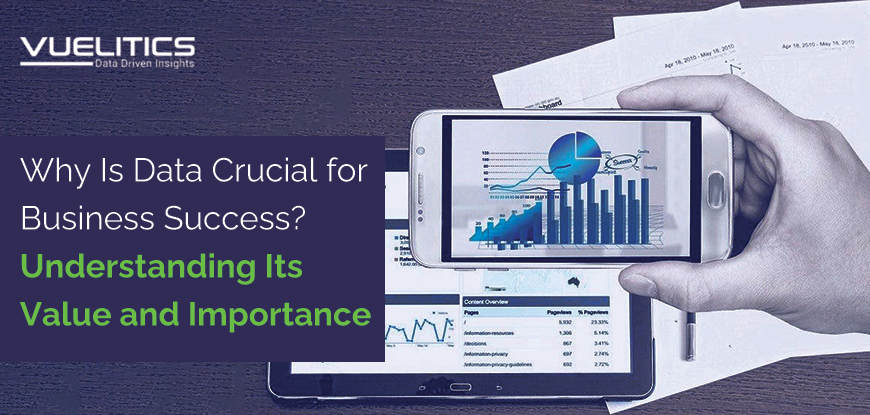- Home
- Blogs

Why Is Data Crucial For Business Success? Understanding Its Value And Importance
In the modern digital economy, data is the new capital of business expansion. Every choice, from how to engage customers to the operation of a supply chain, is now more and more influenced by data-based insights. Whether you are a founder of a startup or an operator in a big company, knowing the value of your data is no longer negotiable; it’s mandatory.
In this blog, we want to look at why data matters in business and the value it brings companies as they operate, but also how businesses can use it long after boat, bumping rides through hydraulic-gauged yellow homes.
Why Does a Business Need Data?
At the heart of it, data is a collection of facts, figures and insights from multiple touch points: customer contacts, financial transactions, marketing channel actions and even employee productivity. But data alone is worthless until it’s analyzed and interpreted.
Why Data Is Important to a Business?
- Smart Decisions: Data eliminates the need for you to guess. Leaders can rely on real-time insights, making decisions based on solid evidence.
- Better Understanding of Customers: Data reveals customer behavior, tastes, and requirements, thereby enabling micro-segmentation.
- Increase Efficiency: Businesses can use workflow analysis to figure out how and where efficiency lags, then improve those areas.
- Competitive advantage: Firms that believe in the power of data now have a competitive edge over those organizations that continue to make decisions based on hunches and gut feelings.
- Anticipating the Future: Businesses can use predictive analytics to forecast market trends, customer behavior and potential threats.
Why Data is King in the Modern Business World?
Data’s relevance is as a compass for evolution, innovation and flexibility. The businesses that use data are superior to those that don’t. Here’s its role in three crucial areas:
Strategic Planning
Managers and executives can no longer base their decisions solely on gut feel. These data-driven methods can help you align your business objectives with the trends, needs of customers, and budget that are appropriate.
Marketing and Sales Optimization
Data analytics informs us which campaigns are successful, what products and services people prefer, and where we have prospects. Companies can track conversion rates, customer journeys, and ROI to customize their marketing.
Customer Experience Enhancement
Nowadays, personalization has become the norm. Data enables a company to provide relevant recommendations, deliver targeted emails, and give shopping rewards that connect with the individual’s needs.
Risk Management
Data is a powerful tool for the identification of risks at an early stage and for the taking of preventive measures, be it for the detection of fraud or for the monitoring of compliance.
Innovation and Product Development
Data reveals what customers want and what they don’t. Businesses leverage these insights to invent new products or develop better ones to satisfy demand.
The Value of Data in Business
The reality is, data used for business provides an end product, that being gleaned data translated into actionable intelligence. Firms that are making strategic investments in data management and analytics are also likely to realize substantial returns on these investments.
- Increased revenue: Companies can recognize those customers who bring the most value and allocate resources that maximize profits.
- Saving Money: By analyzing process data, making businesses more efficient, and saving money as a result.
- Employee Performance: Measuring employee work and process efficiency with the help of data.
- Innovation: Information creates new ideas, business models and digital transformation strategies.
In other words, organizations that truly get the potential of data create an agility culture as well—one where decisions are fast and effective.
The Importance of Data in Business Today
Welcome to the era of data overload, where businesses churn out new data on a daily basis. But only those that are extracting collecting, sorting and gleaning from it can take full advantage of it.
The following are some of the reasons why data is crucial in business today:
- Digital Transformation: Cloud, AI, and IoT are all dependent on data-driven knowledge.
- Customer Expectations: Thanks to Netflix, the modern customer is used to personalized, intelligent experiences.
- Worldwide competition: All lines of business are using big data for competitive advantage, lag and lose!
- Compliance: There are legal reasons, including GDPR and HIPAA that companies need to responsibly manage and safeguard customer data.
Real-World Example: Data Driving Success
Take the example of Amazon. The company recommends products to customers based on their browsing histories, purchases, and reviews. This data-driven personalization has been a crucial factor in its worldwide success. Likewise, Netflix bases recommendations (and even creates new shows) on viewing data to customize the user experience.
These are just examples of how organization that understand the value of data can walk over competitors.
How to Turn Data into Powerful Marketing Insights?
Recognizing the value of data is only the beginning. To make sure your business is gaining the most from its use, a best practice approach to using data would include taking the following steps:
- Gathering the correct information: Don’t overload employees with numbers; only share with them data that is valuable and can be put into action.
- Quality of the data: Incorrect or obsolete data can lead to misleading decisions. Routine purification and validation are critical.
- Invest in analytics tools: Utilize BI and analytics tools and dashboards to gain better insights.
- Educate employees: Create a culture of data and ensure that every employee knows how to use insights in everyday tasks.
- Protect data: Keep sensitive data safe with strong security and compliance filters.
Conclusion
The value of data in organizations cannot be understated. It is the lifeblood of decision-making; it fuels customer satisfaction and drives innovation. Data-driven businesses, from small startups to multinational companies, will define the future.
Every day is a change in the world. Still, data is the thing that keeps you stable and gives you understanding and foresight. And this is precisely the reason why data in business is not just valuable as a resource but as a strategic asset that accounts for the company’s success over time.
FAQs
Why is data relevant to a business?
The main reason data is valuable to companies is that it provides them with the necessary information upon which they can base their decisions. Companies can achieve more stable gains if they use data rather than rely on their gut feelings to track customer behavior, financial well-being, and market trends.
What does data mean in business?
The power of data is its capacity to turn the raw into the cooked. It enables businesses to optimize operations, enhance employee productivity, cut costs and find new ways to grow and innovate.
How can companies build data quality and trust?
The importance and need for businesses to have data governance, acquire data through automated collection systems, and verify the authenticity of the data. Insight and decision content is reliable when data is clean, consistent, and current.
Why is data a strategic asset in business today?
Data is an asset in the strategic sense, affecting longer-term business health. It powers digital disruption, fosters predictive analytics and helps you conform to regulations while building strategies centered around customers.



Post Comments